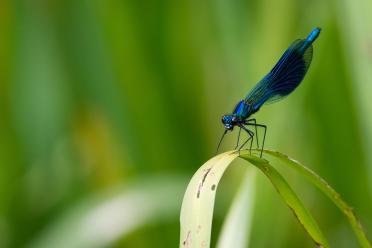Why gene editing is vital to protect nature
If you care about nature, then you should care about gene editing. Gene editing can increase crop yields without habitat loss and reduce reliance on toxic chemicals which destroy nature.
Our planet is in crisis; climate change and biodiversity loss are impacting every aspect of life on earth. From increased natural disasters to proliferation of disease – our global society must change to reduce the threat.
Gene editing offers a solution to future-proof global food security, enabling crops to tolerate drought conditions, reduce susceptibility to diseases and pests, and increase nutritional value. Our food systems simply cannot survive the accelerating crisis without it.
Gene Editing is a technology that enables scientists to make precise changes to the DNA of plants.
It is a very similar technique to traditional breeding which involves selectively choosing plants with favourable characteristics to breed. Nowadays the majority of crops we eat have been highly modified through traditional breeding.
However, with gene editing scientists can be faster, more efficient and effective - eliminating issues that occur with less precise traditional breeding techniques.
The UK Government has recently changed the law to enable gene edited plants to be commercially available in England.
Over the past few years researchers at the Earlham Institute have advocated for this change by engaging with policy makers and helping parliamentarians to understand why this change is urgently needed.
The Earlham Institute is now helping the Food Standards Agency and government officials to establish a new regulatory system that will authorise gene edited plant products for the consumer market. Customers will soon be able to buy gene edited produce that has been developed to offer health or environmental benefits.
The well-established scientific process of gene editing works by removing, editing or adding pieces of DNA which give instructions to cells to produce specific characteristics. These characteristics can enable plants to survive our rapidly changing environment.
Currently agriculture relies upon an extraordinary amount of fertilisers and pesticides to increase crop yields. Whilst this does increase food production, it also causes significant damage to the environment. However, it doesn’t have to be this way. Gene editing can prevent and reduce the reliance on fertilisers and pesticides.
Here’s why it matters:
More than 40% of insects are threatened with extinction. One of the main causes of their decline is attributed to the use of pesticides and fertilisers. Yet, insects are an integral component of a healthy ecosystem – they are pollinators, enabling plants to produce fruits and seeds, as well as controlling other pests. They are also a food source; without insects – other wildlife will decline too.
Furthermore, more than half of the world’s biodiversity is found in soil. From bacteria to earthworms, soil is the foundation from which biodiversity grows and thrives. The relentless use of agricultural chemicals destroys delicate soil ecosystems and as a result harms the biodiversity that depends upon it.
Researchers at the Earlham Institute are studying the interactions between plant roots and soil bacteria to explore new approaches to improving nutrient uptake and defences against pathogens in crop plants.

Increasing agricultural productivity to meet demand and ensure economic viability, results in more land being used for farming. This means important habitats for wildlife such as hedgerows, woodlands and meadows are being lost – the 2023 State of Nature report classifies the UK as one of the most nature-depleted countries in the world.
Even organic farming, which is considerably better for biodiversity, has issues around low yields and therefore will need to convert more land for farming to be viable.

From the creation of these toxic chemicals to transportation, the use of pesticides and fertilisers heavily contributes to climate change. The danger of this reliance on fossil fuels is not only bad for our planet, but also means our food systems are subject to the volatile nature of the fossil fuel markets.
The chemical fertiliser industry is a $200 billion operation - profiting from causing climate change and biodiversity loss.
Gene editing is the future. It can increase crop yields without habitat loss and reduce reliance on toxic chemicals which destroy nature. It is a viable solution with a great deal of scientific evidence that can ensure food security as well as a world where nature thrives.
What could be more important than that?
Read more about our work advocating for the adoption of gene editing in agriculture: